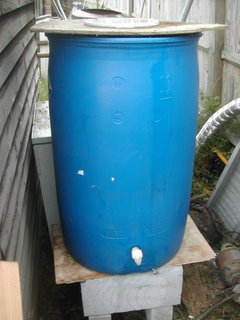
Here's the filter barrel that Tim and I made at the weekend. It took about an hour and within no time at all was filtering the oil to the standard required to run a diesel engine.
Today is Midsummer's Day - and there is no better time to start thinking about your renewable home heating project for the next heating season.
Within 90 days, it will be time to turn on the central heating system again, and now you have the option of continuing to pay the utilities for over priced, non-sustainable fossil fuels, OR break free from those shackles, and generate your own heat and power entirely from waste vegetable oil. A lot of UK householders are going to get a big shock when they see their utility bills next January!
My own renewable heat and power installation received a boost this week when Tim came over from Ireland and gave me a crash course in waste veg oil filtering.
Waste veg oil is rather unpleasant stuff, but a whole lot nicer than petrol or diesel. Once you get into a routine of collecting oil from pubs and restaraunts - religiously every week (so as not to piss off the owner or chef), and keeping your filter barrel topped up on a daily basis - just 5 minutes per day, then the rest is child's play.
Today was a rather dull day and the solar water heater doesn't perform too well when it's cloudy -so I rigged up a cable direct from the Lister alternator to my 3kW immersion heater in the hot water tank, and ran the Lister for a couple of hours on filtered waste vegetale oil - courtesy of my local pub.
It soon became apparent that the alternator had power to spare, so the dishwasher was plugged into a 30 foot extension cable and this was then plugged into the Lister alternator.
I am now in the process of installing a 20 gallon hot water / cooling tank, adjacent to the Lister, so that it has plenty of coolant capacity, and it can heat my domestic hot water from its coolant via a copper coil in the local coolant tank.
It should be remembered that a typical diesel engine converts on third of its fuel energy into mechanical power and the other two thirds appear as waste heat via the exhaust and coolant circuit. If it's heat that you are after - then there is no better way of converting waste vegetable oil into heat than using a slow speed diesel engine. No worries about Turk or Babington burners in this household!
If you want to follow this route, you need to pass a simple test: Just stick your forearm up to the shoulder into a barrel of rancid veg-oil gloop to tighten a leaking drain tap. If you can cope with that - then you are en route for sustainable free fuel forever!
We hope to have some of this technology on display later this summer at the Great Dorset Steam Fair.
No comments:
Post a Comment